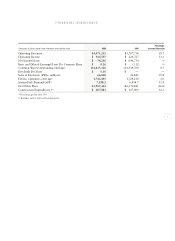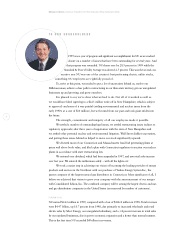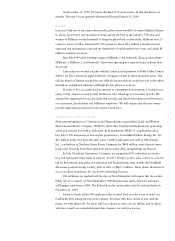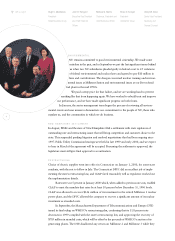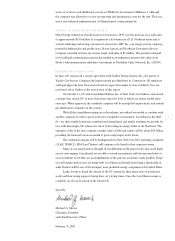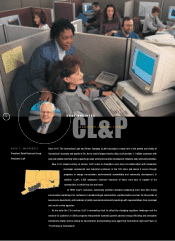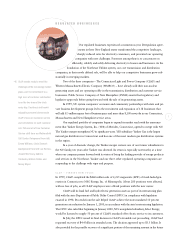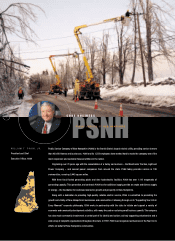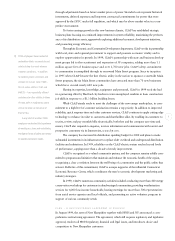Eversource 1999 Annual Report Download - page 13
Download and view the complete annual report
Please find page 13 of the 1999 Eversource annual report below. You can navigate through the pages in the report by either clicking on the pages listed below, or by using the keyword search tool below to find specific information within the annual report.
11
Through public and private partnerships
ranging from land use assessment
and planning, to promoting environ-
mental stewardship, to job initiatives
and general economic development,
WMECO contributes significantly to
the region’s economic vitality and
quality of life.
In Springfield, Massachusetts,
WMECO is involved in improving urban
lighting, promoting the revitalization
of Union Station, and fostering the
growth of small business. Here (left
to right), Phyllis Magoon, General
Manager of the Springfield District,
Maurice Nichols, Account Executive
and Bill Connor, New Service Manager
confer outside City Hall with Springfield
Mayor Michael J. Albano.
The final agreement was jointly developed by New Hampshire Governor Jeanne Shaheen,
PSNH and NU, the Office of Attorney General, the Governor’s Office of Energy and Community
Services, and senior staff members of the New Hampshire Public Utilities Commission. Throughout
the lengthy negotiation process we consistently pursued our goal of reaching a resolution outside
of litigation. Arriving at a fair and balanced agreement not only achieves this goal, it also signals
a marked improvement in the company’s relations with its regulators and the state.
In addition to bringing electric restructuring and retail choice to New Hampshire, the agree-
ment includes a proposed rate decrease for PSNH customers of about 18 percent. As proposed
in the agreement, this rate reduction would be achieved through the sale of PSNH’s power plants,
an after-tax write-off of $225 million, and the refinancing of $725 million in stranded costs using
rate reduction bonds – a process known as “securitization.”
In addition to agreeing to sell PSNH’s power plants as part of the restructuring agreement,
NU has agreed to sell its investment in Seabrook Station, now held through its North Atlantic
Energy Corporation (NAEC) subsidiary, thereby canceling NAEC’s power contract with PSNH.
Another milestone in the move toward choice and competition involved an agreement
between PSNH and the New Hampshire Electric Cooperative (NHEC), PSNH’s largest wholesale
customer. Announced in September 1999, the agreement terminated a long-standing wholesale
power contract between the two companies. The termination agreement includes a payment by
the NHEC to PSNH and allows the NHEC to offer its 70,000 customers significantly reduced
rates and the ability, as of January 1, 2000, to choose alternative energy suppliers.
Building on its knowledge, expertise and strong reputation for customer relations and serv-
ice, PSNH plans to play a major role as a delivery company in the new energy marketplace. The
company will continue its aggressive account management strategy to retain and increase revenues
from its existing large industrial and commercial customers. It also plans to promote targeted elec-
trotechnologies for commercial and industrial applications designed to displace less efficient,
nonelectric processes.
The restructured environment provides new opportunities for PSNH to offer a variety
of services to new energy suppliers. As part of this effort, the company introduced a sophis-
ticated customer bill in 1999 that anticipates retail choice and the potential for offering supplier
billing services. PSNH also launched a redesigned and updated Web site (www.psnh.com) in
1999 to provide customers with online account information and enhanced self-service capabilities.
The onset of competition occurs at a time of strong economic growth in New Hampshire,
and PSNH has been a leading force in contributing to this development. In addition to
working with state and local economic development organizations to attract new businesses
to New Hampshire – and new customers to PSNH’s service territory – the company has
actively supported the growth of businesses already located in the state. These efforts have
ranged from funding an export marketing grant program allowing small New Hampshire
companies to enter or expand into international markets, to assisting business incubators and
downtown revitalization programs, and supporting work force development initiatives to
ensure a steady stream of skilled employees for New Hampshire companies.
As PSNH prepares for the changes in its business marketplace, one constant continues to
underlie all of its other initiatives: the company’s deep commitment to New Hampshire’s com-
munities and the environment, such as PSNH’s sponsorship of the production and distribution of
a detailed curriculum for educators’ use in teaching New Hampshire history. PSNH is also the
first utility in the nation to use sheep to graze its power line rights-of-way as an environmentally
friendly alternative to traditional vegetation control methods.


